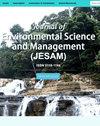菲律宾吕宋岛南部以牛为基础的森林系统的社会生态转变
IF 0.3
4区 环境科学与生态学
Q4 ENVIRONMENTAL SCIENCES
Journal of Environmental Science and Management
Pub Date : 2020-12-30
DOI:10.47125/jesam/2020_sp2/01
引用次数: 0
摘要
利用土地覆盖趋势和社区观念分析了菲律宾巴丹加斯、罗萨里奥、圣伊西德罗森林系统的社会生态转变。采用遥感处理、随机调查和参与式研究相结合的方法。六种土地覆盖类型中的四种(森林/果园、草地、农田和水体)被确定为景观生态系统服务的来源,这对养牛至关重要。2000年,这片土地成为养牛的农场研究基地。再加上土地私有化和基础设施发展等其他社会因素,随着时间的推移,这重塑了土地覆盖的变化。为此,养牛动态,特别是在关键干旱期,已通过转向增加商业饲料补充等措施进行调整。尽管社会生态发生了转变,但景观中以牛为基础的森林系统通过展示多样性、连通性和反馈管理等关键弹性原则而持续存在。但是,应该解决对关键问题(例如土地私有化)的进一步影响的关切,以维持景观中以牛为基础的森林放牧系统。这项研究为社区自然资源管理和决策者的政策提供了重要的见解,在面对快速转型的社会生态系统时,他们应该仔细考虑它们在维持当地重要生态系统服务方面的潜在影响。本文章由计算机程序翻译,如有差异,请以英文原文为准。
Social-ecological Transitions in a Cattle-based Silvopastoral System in Southern Luzon, Philippines
Social-ecological transitions in the silvopastoral system of San Isidro, Rosario, Batangas, Philippines were analyzed using land cover trends and community perceptions. A combination of remote sensing processing, randomized survey, and participatory approaches were conducted. Four of six land cover categories (forests/orchards, grasslands, crop fields and water bodies) were identified to be sources of ecosystem services in the landscape which are essential for cattle farming. In 2000, the landscape became an on-farm research site on cattle farming. Coupled with other social factors such as land privatization and infrastructure development, this has reshaped land cover changes over time. In response, cattle farming dynamics, especially during critical dry periods, have adapted through measures such as switching to greater supplementation of commercial feeds. Despite social-ecological transitions, the cattle-based silvopastoral system in the landscape has persisted by exhibiting key principles of resilience such as diversity, connectivity, and feedback management. However, concerns on further impacts of key issues (e.g., land privatization) should be addressed to sustain the cattle-based silvopastoral system in the landscape. This study provides critical insights on how natural resource management by communities and policies by decision makers should carefully consider their potential impacts in sustaining locally important ecosystem services in the face of rapidly transitioning social-ecological systems.
求助全文
通过发布文献求助,成功后即可免费获取论文全文。
去求助
来源期刊

Journal of Environmental Science and Management
ENVIRONMENTAL SCIENCES-
CiteScore
0.90
自引率
0.00%
发文量
10
审稿时长
2 months
期刊介绍:
The Journal of Environmental Science and Management (JESAM) is an international scientific journal produced semi-annually by the University of the Philippines Los Baños (UPLB).
JESAM gives particular premium to manuscript submissions that employ integrated methods resulting to analyses that provide new insights in environmental science, particularly in the areas of:
environmental planning and management;
protected areas development, planning, and management;
community-based resources management;
environmental chemistry and toxicology;
environmental restoration;
social theory and environment; and
environmental security and management.
 求助内容:
求助内容: 应助结果提醒方式:
应助结果提醒方式:


